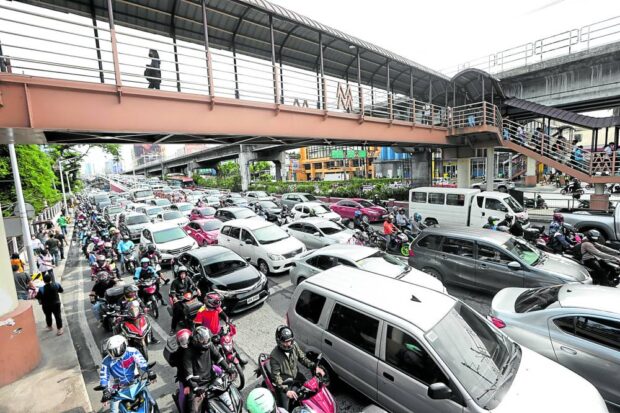DOTr goal by 2027: Pedestrian-friendly Edsa
MANILA -The Edsa Greenways Project—a 5-kilometer elevated walkway traversing Metro Manila’s busiest thoroughfare—is slated to start construction by next year, according to the Department of Transportation (DOTr), in line with its initiative to promote active transport.
Transport Secretary Jaime Bautista, during a budget hearing on Monday, said the civil works for the pedestrian project would start in June 2024 and were targeted for completion by Feb. 2027.
“To promote sustainable mobility options for Filipinos, the [DOTr] is also pushing for pedestrianization with the Edsa Greenways Project, which aims to connect pedestrian networks to key train stations along Edsa, namely Balintawak, Cubao, Guadalupe and Taft, to enhance the overall urban environment and transport connectivity in the identified areas,” he said.
Currently, the DOTr is working on the right-of-way acquisition and relocation of utilities that would be affected by the project.
He said relocation works had already been done in Guadalupe and Balintawak. The entire Edsa highway spans 23.8 kms.
Article continues after this advertisementThe DOTr is working on this with the Asian Development Bank, which approved a P5.9-billion loan for the project in 2020. Total project cost was previously estimated at P8.5 billion.
Article continues after this advertisementActive transport
Along with this, DOTr Undersecretary Anneli Lontoc said they would procure services for the creation of feasibility studies related to active transport programs.
The department, apart from the expansion of bike lanes, seeks to establish end-of-trip cycling facilities like bike racks and public transport stops to make bike commuting more convenient for the public.
The government inaugurated in March the construction of 9.6 kms of bike lanes and pedestrian walkways in Intramuros.
Last month, the DOTr broke ground for the 3.2-km bike lane in Laoag and launched the 13.16-km bike lane project in Kalibo.
About 564 kms of bike lanes are currently established in Metro Cebu, Metro Manila and Metro Davao. The DOTr wants to expand the network to 2,400 kms by 2028.
“Building continuous networks of sidewalks and bike lanes throughout a city enable more people to travel independently, at much lower cost, with minimal environmental impact, and with more predictable travel times,” Robert Siy, coconvenor of transport advocacy group Move as One Coalition, told the Inquirer earlier. INQ
